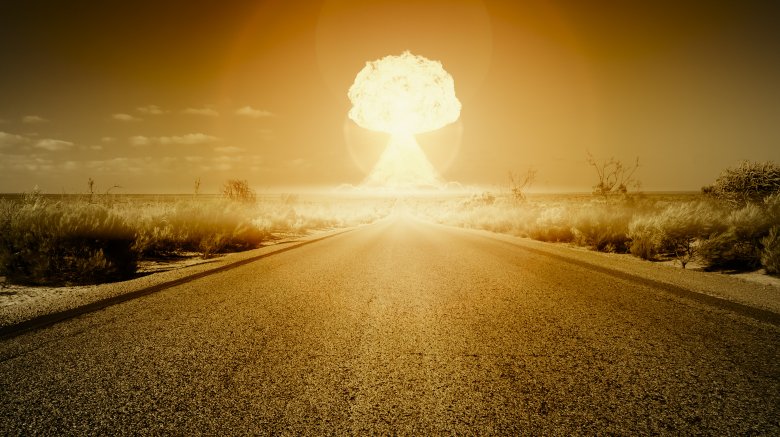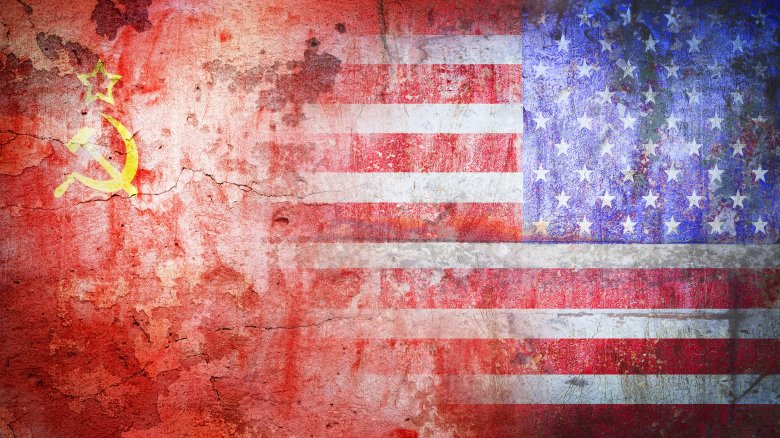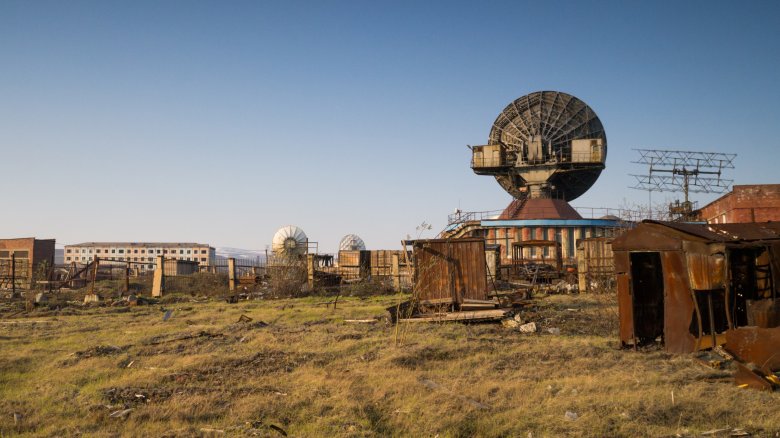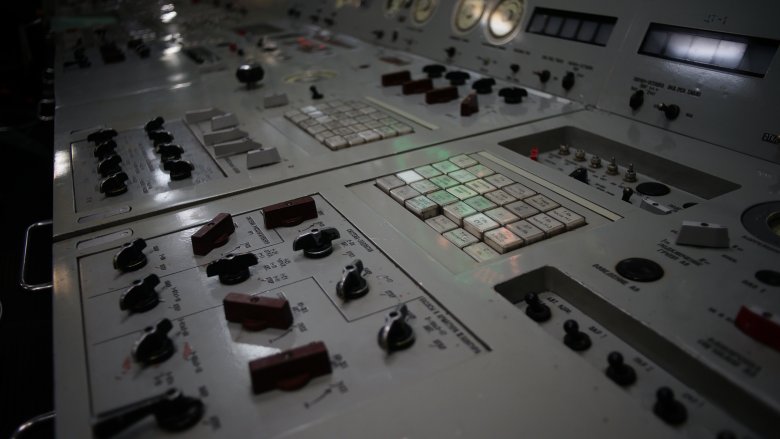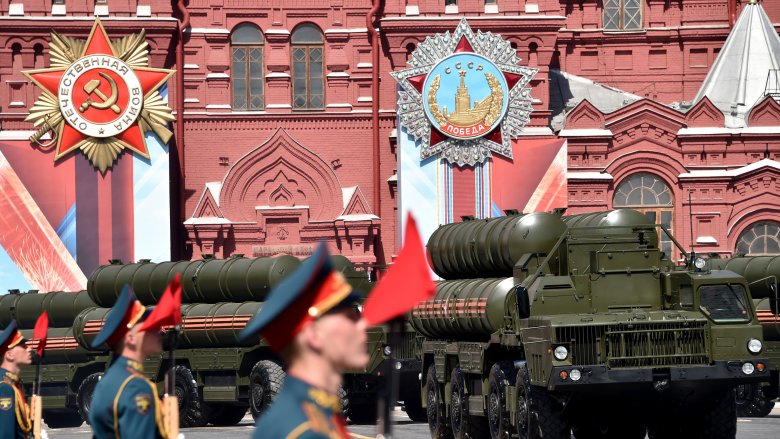The Man Who Saved The World From Nuclear Armageddon
In the 1980s, Cold War tensions were at an all-time high. The continued existence of the world as we knew it was resting on the shoulders of military and world leaders who were waiting for the other person to blink first. Things came to a head in 1983, and if it wasn't for the gut feeling of one man, you probably wouldn't be sitting here now. According to the Washington Post, when he died on May 19, 2017, only his family noticed. Let's notice now.
Setting the scene
The day the world almost ended was September 26, 1983, and if Stanislav Petrov did what he did at any other time, it would have been impressive. What was going on in the world at the time made it even more impressive.
Take a gander at a Cold War timeline, and you'll see how quickly things heated up after World War II. By 1949, the Soviets proved they had atomic bomb technology, too, and tensions continued to boil through the Korean and Vietnam Wars. In 1979, NATO approved a U.S. request to set up 572 nuclear warheads in Europe — in range of the USSR — in case the Soviets didn't get rid of their missiles. It was a clear case of, "Do as I say, not as I do," and rollout started in 1983. That was the same time Reagan announced the beginning of the Star Wars program, Red Dawn was being filmed, and "99 Luftballoons" was on the radio.
Then, on September 1, 1983, Korean Air Lines 007's autopilot guided the Boeing 747 into Soviet air space (at least 200 miles off-course, according to CNN), where it was shot down by Soviet fighters operating under the impression the non-responsive craft was a military plane. An unthinkable 269 civilians were killed, and the outrage was instant. Only a few weeks later, Soviet command was pretty sure the Americans had launched some of those missiles.
Oko and why the alarm sounded
The Soviet's early-warning system was called Oko, and according to PBS's NOVA, it worked on a different principle than similar U.S. satellite systems. Instead of looking straight down at the Earth like the U.S. system did, Oko looked at the world's horizon. It was watching for the silhouette of missiles, which could be seen — in theory — when they were only about 5 miles off the surface. The idea was that by monitoring the edge of the world, the satellites were less likely to mistake any natural phenomena for missile launches. Then it made that exact mistake.
There's a lot about Oko — and the entire incident — the Western world just doesn't know, but we do know it was a bizarre natural alignment that caused the alarm to sound. The Soviet Molniya satellites were suddenly aligned with sunlight reflecting off high-altitude clouds at the same instant they came into view of the U.S. missile fields. The system mistook the reflection for airborne death and sounded the alarm.
Stanislav Petrov
The man monitoring Oko when the alarm sounded was Stanislav Petrov, a lieutenant colonel in the Soviet Air Defense Forces. He was 44 years old, the son of a nurse and a World War II fighter pilot. Born at the start of the war — on September 7, 1939 — he went to the Kiev Higher Engineering Radio-Technical College of the Soviet Air Force, and according to The New York Times, his career moved pretty quickly once he joined the Air Defense Forces. He'd been with Oko from the beginning, and it was his job to decide what to do with the information the computer was giving him.
When the alarms started to sound, around 200 people were looking to him for instructions while time was ticking. The missiles would only be in the air for 25 minutes before they hit their target, and when it's a matter of life and death, that's not long at all. Sitting on his desk was a phone with a direct line to the highest of the high command, and he knew he was supposed to pick up that phone and tell them a nuclear strike was on the way. "I couldn't move," he told the BBC. "I felt like I was sitting on a hot frying pan."
Trusting his gut
It's impossible to stress how difficult a decision Petrov was faced with when the warning lights started flashing. On one hand, he could do as he'd been trained to do, pick up the phone, call Soviet high command, and start World War III. (No exaggeration.) On the other hand, he could ignore protocol, and if he was wrong, he'd be leaving his country defenseless in the face of a nuclear attack.
That's the very definition of "between a rock and a hard place," without even taking into account the threat of what would happen to him once high command found out. This was Cold War-era USSR, after all, and this was no training mission.
"I had a funny feeling in my gut. I didn't want to make a mistake. I made a decision, and that was it," he told the Washington Post. "I refused to be guilty of starting World War III. ... If I made the wrong decisions, a lot of people will die. A lot of people will die." Petrov would go on to say that his decision was based heavily on a single thing that didn't make sense in that moment. According to Oko, there were five missiles on the way. Why would the U.S. only send five? He decided not to push the Big Red Button.
He faced some serious repercussions
Obviously, we don't know everything that went on behind the closed doors of the USSR, but we do know Petrov faced some serious interrogation for his part in choosing not to alert his superiors of the potential danger, deciding for himself it was a false alarm. He didn't have much evidence on his side: only that ground radar hadn't reported any signs of an attack, and he didn't think the U.S. would start a war with only five missiles. But he would later tell the Washington Post after a brief pat on the back, he was on the receiving end of a major investigation.
One of the big questions he was asked was why he hadn't recorded every single event that had transpired that night, and his response was one for the record books: "Because I had a phone in one hand and the intercom in the other, and I don't have a third hand."
You expect to hear that in a movie, delivered by someone like Colin Farrell. Petrov didn't get off easy, though, and even though colleagues and superiors pushed to scapegoat him for the whole incident, it eventually went away with only one official reprimand: According to the BBC, he was disciplined for mistakes in his logbook.
So, how lucky were we that he was on duty?
It took a few minutes for him to decide the warnings were false, and 23 minutes after he made his decision... nothing happened. The BBC says even years later, Petrov says he believed it was about a 50-50 chance he's guessed right, and it's impossible to imagine how long those minutes must have seemed. He also says he felt fortunate it was him on duty at the time, as he was the only one there who'd had the experiences of a civilian education.
"My colleagues were all professional soldiers, they were taught to give and obey orders," he said. If it had been anyone else, military protocol would have been followed and that Big Red Button would have been pushed. Instead, he said to ignore it.
The world only learned about him in 1998
The world almost ended, and no one said a word about it for more than a decade. The incident was so classified that not even Petrov's wife, Raisa, knew about it when it happened ... or ever. She never knew about it (via RT), and she died in 1997, a year before General Yury Votintsev published his memoirs. The former commander of Soviet missile defense, he had retired and finally told the story (via The Guardian).
When Petrov talked to the BBC in 2013, he didn't seem fussed about how long it took for the story to come out. In fact, he seemed absolutely fine with it. "I thought it was shameful for the Soviet army that our system failed in this way," he told them.
Since 1998, Petrov has been honored with some long overdue awards, like the Dresden Peace Prize and honors from the U.N.-based Association of World Citizens.
He never thought he was a hero
Let's be honest here. If you saved the world, you'd want everyone to know about it, right? If you'd headed off nuclear war, you'd probably go out and buy a horse just so you could ride off into the sunset every night because that's what heroes do. Petrov never considered himself a hero, telling the BBC, "That was my job."
Whenever Petrov talked about the decision, he's made it clear there was none of the gung-ho self-confidence you'd imagine in the movie version. He told RT, "My legs went limp. I felt like I couldn't even stand up. That's how nervous I was when I was taking this decision. I'll admit it, I was scared. I knew the level of responsibility at my fingertips." And isn't that real heroism?
His words of warning
He was 74 years old when he spoke with a correspondent from the Russian-language news agency Komsomolka. It might have still been a secret, Petrov said, but he did clarify that yes, the button was red. It hadn't been connected to anything in a long time, though, and Petrov said it was left as a symbol. The button was a leftover reminder of a pre-Chernobyl nuclear accident, when the man in charge had fled the scene rather than make the tough decisions. After that, it was decided computers should have more responsibility and control over just how catastrophic events were handled, but Petrov found out first-hand just how dangerous that could be.
A Time report on Petrov's death said later in his life, Petrov believed the present more important than the past and that he was seeing relations between the U.S. and Russia spiraling down to the same low point they were at in the 1980s. "The slightest false move can lead to colossal consequences," he said. He warned about the dangers of putting too much faith in computers and underestimating the power of nuclear weapons, as well. "That's when things can go terribly wrong. One way or another, you still need a person to launch one of those weapons."
His post-war years and death
Petrov never achieved the rank of colonel, and Komsomolka said his exit from the military was completely voluntary. He retired to care for his sick wife. They lived in a small apartment and dreamed of being able to afford a double-glazed window that would keep the draft out of the kitchen. They were supported on his military pension, which wasn't much — The New York Times said he even started growing potatoes so they'd have something to eat.
His wife, Raisa, lost her battle with cancer in 1997, and when Petrov died of hypostatic pneumonia on May 19, 2017, there were only a few people who noticed. He was living alone at the time, and when the German activist Karl Schumacher called to wish him happy birthday in September, Petrov's son, Dmitri, said he'd been buried with a funeral that had only a few family members in attendance. Schumacher talked to the Washington Post when he announced Petrov's death to the world, saying he regretted that he hadn't been there himself. He didn't get to say what he wanted to say: "Thank you, Mr. Petrov."
